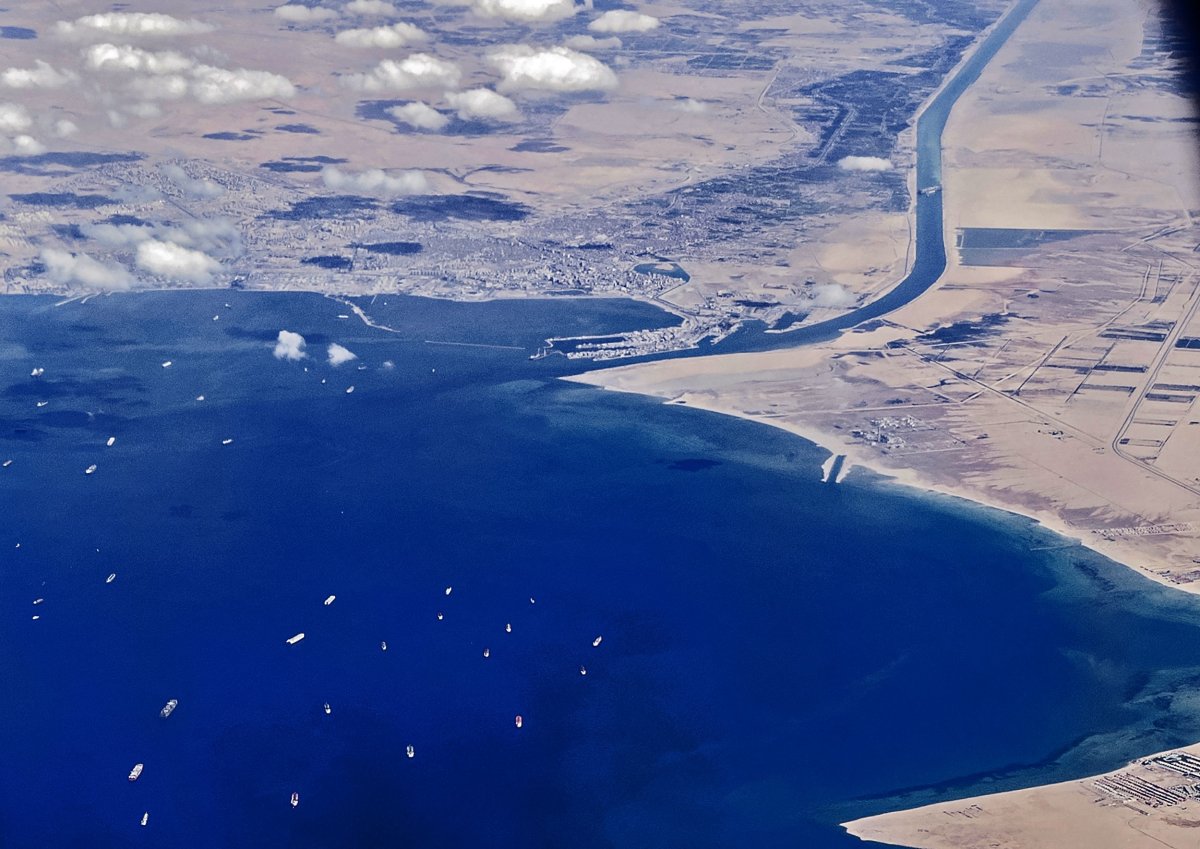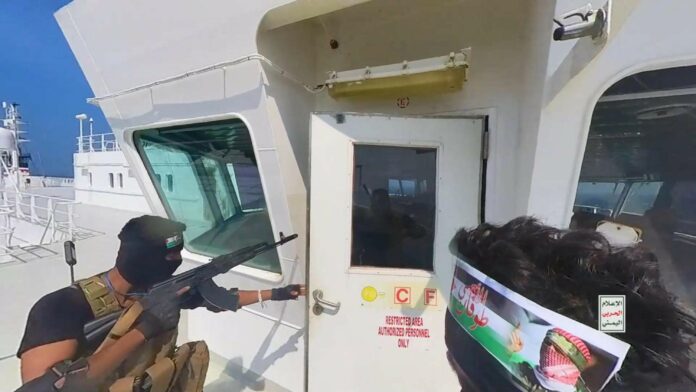A Norwegian oil tanker in the Red Sea was blasted by a missile fired from Yemen’s Houthi rebels—in an attack that could have far-reaching implications for international trade and the global economy.
The assault on the tanker on Tuesday apparently marks an escalation for the Iran-backed group, which recently admitted responsibility for targeting Israeli or Israeli-linked commercial ships in the region.
The Houthis support Palestinian-based Hamas, a U.S.-designated terror group that is at war with Israel after it launched a deadly attack on the country on October 7 and kidnapped hundreds of civilian hostages. Israel responded with a series of devastating airstrikes across Gaza and a ground invasion, reducing entire areas to rubble.
But the latest attack against the Strinda, a Norwegian-flagged tanker with no apparent ties to Israel, suggests the Houthis have expanded their campaign, according to the Associated Press. By firing at ships close to the Bab el-Mandeb Strait—which is an entryway to the Red Sea and the Suez Canal—the group could potentially choke off access to crucial global shipping routes and increase the international impact of the war currently raging in the Middle East.
Houthi Movement via Getty Images
The U.S. military’s Central Command issued a statement on Tuesday saying an anti-ship cruise missile “launched from a Houthi-controlled area of Yemen” hit the Strinda. “There were no U.S. ships in the vicinity at the time of the attack, but the USS Mason responded… and is currently rendering assistance,” the agency added.
The British military’s United Kingdom Maritime Trade Operations had earlier reported that a vessel was battling a fire on board, and—while it did not name the tanker—the coordinates corresponded with the Strinda‘s last-known location, AP reported.
Geir Belsnes, the CEO of the Strinda‘s operator, J. Ludwig Mowinckels Rederi, said: “All crew members are unhurt and safe. The vessel is now proceeding to a safe port.” The tanker was carrying a cargo of palm oil from Malaysia and was heading for the Suez Canal en route to Italy, Belsnes said.
But Houthi military spokesperson Brig. Gen. Yahya Saree issued a video statement alleging that the ship was bound for Israel. He added that the rebels only fired on the Norwegian-flagged vessel when it “rejected all warning calls.”
A Polish news-curating account called Visegrád 24 on X (formerly Twitter) shared a map showing the “usual shipping route” taken by Israel through the Bab el-Mandeb Strait, the Red Sea, and the Suez Canal, contrasted with a new “route forced by Yemen” that shows a long journey around Africa and past southern Europe to reach its shores.
Sharing the map, the account captioned the image: “If we will see significant fighting between Houthis and other military forces around the Bab al-Mandab Strait, the Suez Canal will likely be inaccessible for days or weeks. It’s a severe threat to international maritime trade (and by extension, the world economy)”
If we will see significant fighting between Houthis and other military forces around the Bab al-Mandab Strait, the Suez Canal will likely be inaccessible for days or weeks.
It’s a severe threat to international maritime trade (and by extension, the world economy) pic.twitter.com/oh0TAQrWHM
— Visegrád 24 (@visegrad24) December 12, 2023
The incident against the Norwegian-flagged vessel this week follows a string of similar Houthi attacks a little over a week ago. Three commercial ships (one flagged as being from the Bahamas and two from Panama) were hit by missiles in the Red Sea, while a U.S. warship shot down three drones in self-defense that same day, the U.S. military said, although it stopped short of saying its ship had been targeted.
“These attacks represent a direct threat to international commerce and maritime security,” the U.S. military’s Central Command said in a statement. “They have jeopardized the lives of international crews representing multiple countries around the world… We also have every reason to believe that these attacks, while launched by the Houthis in Yemen, are fully enabled by Iran.”

MAHMOUD KHALED/AFP via Getty Images
Speaking after the previous clashes, Saree, the Houthi spokesman, said: “The Yemeni armed forces continue to prevent Israeli ships from navigating the Red Sea (and Gulf of Aden) until the Israeli aggression against our steadfast brothers in the Gaza Strip stops. The Yemeni armed forces renew their warning to all Israeli ships or those associated with Israelis that they will become a legitimate target if they violate what is stated in this statement.”
The Houthis were designated a terrorist organization under the administration of then-President Donald Trump in January 2021, but the designation was revoked soon after President Joe Biden took office in a bid to ensure aid got into civil war-torn Yemen.
However, last month, the White House confirmed it was mulling over reinstating the group to its list of terrorist organizations, after Houthi armed pirates raided a ship called the Galaxy Leader in the Red Sea. The vessel was operated by a Japanese company that has links to Israeli businessman Abraham “Rami” Ungar. Video footage showed Houthi rebels dancing in celebration with Palestinian and Yemeni flags.
Uncommon Knowledge
Newsweek is committed to challenging conventional wisdom and finding connections in the search for common ground.
Newsweek is committed to challenging conventional wisdom and finding connections in the search for common ground.


